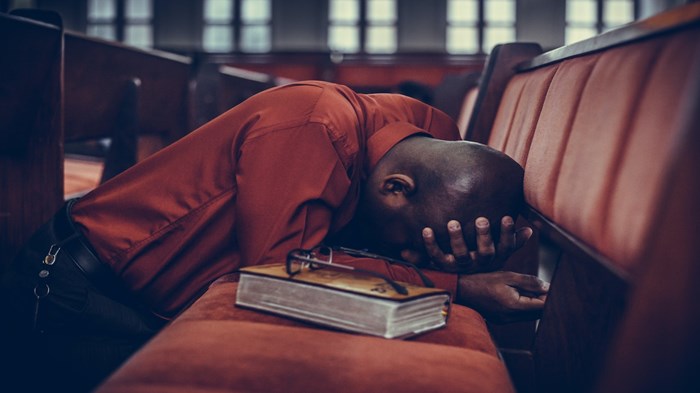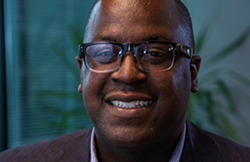Systems, Sin and Sanctuaries

SMcK: Greg Armstrong is the pastor at Renew Church, the director of enrollment at Northern Seminary, and a seminary student at Northern.
Now to Greg Armstrong:
I recently had a fellow white pastor friend argue that the blood of Jesus is enough to heal the world of it’s prejudices and racial tendencies, and we all need to trust in Jesus to rid America of it’s racist ideology. I agree. However, while I certainly subscribe to the richness of Christ’s blood and salvific work for all mankind, I’ve found that the ignoring of proper context, history and social perspective will allow people to use biblical truths as an excuse to avoid the harsh realities and conversations around systemic racism. Of course, the totality of my thoughts can’t be expressed in a blog post, but I hope to offer insight into what we’re dealing with as it relates to our country and our churches
Here is what I’d like my white brothers and sisters to know about the systems of racism in America and the church.
The History
As we deal with the painful loss of Mr. George Floyd and countless other black individuals that have been murdered at the hands of white people, it is crucial that we understand these occurrences in light of a larger reality. These murders were not isolated incidents by rogue racists, they were killings supported by a structure and system that deem it permissible to harm and abuse people of color without fear of much consequence. This is the “system” that has taken many forms and functions over the generations of American society, yet still has the same underlying infrastructure, power.
From slavery, to reconstruction, to the realities of Jim Crow, there has been a deep seated framework for whiteness that we must expose in order to move forward in reconciliation. Now you may adamantly declare, “I’d never do that” or “I’d never stand for that”, and I’m sure you wouldn’t. But I need my white brothers and sisters to understand that we have inherited a history that involves the brutalization of people with brown skin and oftentimes you must deal with the ramifications of the sins of your forefathers in order to appropriate proper equality upon people in your generation. If there is no legitimate acknowledgement and repentance of America’s history of injustice towards people of color, it will be impossible to move forward in any form of solidarity and reconciliation. The issue lies in the framework of the system, and while the system caters towards white privilege it is drastically uncomfortable for any person of color to reside in. This is the tension black people are in and one you may never experience. Unfortunately it’s perpetuated by government, educational systems and power dynamics within our culture. I’m aiming, as a black man and your brother, to give you a glimpse inside of a world that you may not fully discern because it was made for you.
This is the core fundamental reality concerning our country's history. Ignoring this reality, or dismissing it as “the past” causes great harm toward any sorts of momentum moving forward. There must be an awareness and confession of the systemic racism that is interwoven into the fabric of our America. There also needs to be an understanding that “race” in itself is a social construct implemented at the core of our country's inception for the purpose of separating and categorizing human importance. This is anti-gospel and unfortunately has created a theological construct that is devastating to the world and the church.
The Church

I remember my friends thinking I was crazy for working for a white pastor. I never understood their hesitation because I attended a majority white Christian school throughout elementary and high school. Most of my ministry tenure has been as a worship/associate pastor in majority white evangelical churches. I will say that I’ve found it easy to navigate majority white spaces when I’ve successfully assimilated to the culture and form. Unfortunately for me the realities of racism were experienced more in the sanctuary than the street. Why? Mainly because it was in these christian spaces where I learned how accepted I was only if I acted like the majority. You couldn’t imagine how many times I’ve received directives such as, “You’re singing that too urban” or “She sings good, but it’s too soulful,” or “we’re not called to that neighborhood!” In those moments I began to realize that my color was accepted but my culture was rejected. For every black creative or professional you hire to enhance your church community, it is imperative that you welcome the totality of who they are, not just what they look like. Here’s the deal, the systems of race and injustice have crept into the sacredness of the church. If we’re honest these same systems in America began with the church. We will do damage to the modern day church if we ignore these implications, and ultimately create more division than unity.
So what do we do? Allow the gospel to shape our Christianity. Galatians 3:28 says There is neither Jew nor Gentile, neither slave nor free, nor is there male and female, for you are all one in Christ Jesus. We can’t use this scripture to justify equality yet force people of color to assimilate to only what’s comfortable in your space. All of our uniqueness, giftedness and cultural differences can be used to honor the Lord and reach a dying world. We must get comfortable with the uncomfortable posture of sitting at the table with people who are different from us for the purpose of gospel reconciliation. Not only do we need to be comfortable sitting at the table, but indeed actively pursue justice with our black and brown brothers and sisters. Using your voice in local government, from the church pulpit and through your media outlets exposing the reality of America’s system of injustice are all ways you can be a part of the solution. We need robust Christology to see the ways in which Christ fostered unity, wholeness and gospel-centric community and culture. It’s unfortunate that you may lose friends and supporters this way, but you’ll gain a family shaped by the gospel narrative that all nations are God’s people.
The Future
I believe in the multiethnic church, and I pastor an intentionally multiethnic church. I also believe in the black church, and the white church. I’m extremely aware that every community will not see multiethnicity or multiculturalism within its geographical location, however, you can have a multiethnic life. I believe that we need to move beyond just having a “black friend” at work or a “hispanic friend” in class. We need to move towards intentional, messy and meaningful relationships that are shaped by the Holy Spirit so that we can see the systems of oppression and racism dismantled. It will only happen by true relationships that are steeped in Godly community and presence. However, in these relationships it is not time to “know everything,” but rather a time of listening and learning about the richness of black and brown culture and how together we can shape a new narrative for our communities and cities. It is also a way in which your privilege within America’s system can be leveraged to see other people groups prosper.
Are you willing to declare Black Lives Matter? If so, I am confident that you and I can shape a future for our children that is infused with the love of Christ, justice for all, and the glory of God.
May we move forward in the power of the gospel, shaped by a community of people who see each other in the Imago Dei, the Image of Christ our Lord.
Jesus Creed is a part of CT's
Blog Forum. Support the work of CT.
Subscribe and get one year free.
The views of the blogger do not necessarily reflect those of Christianity Today.


















